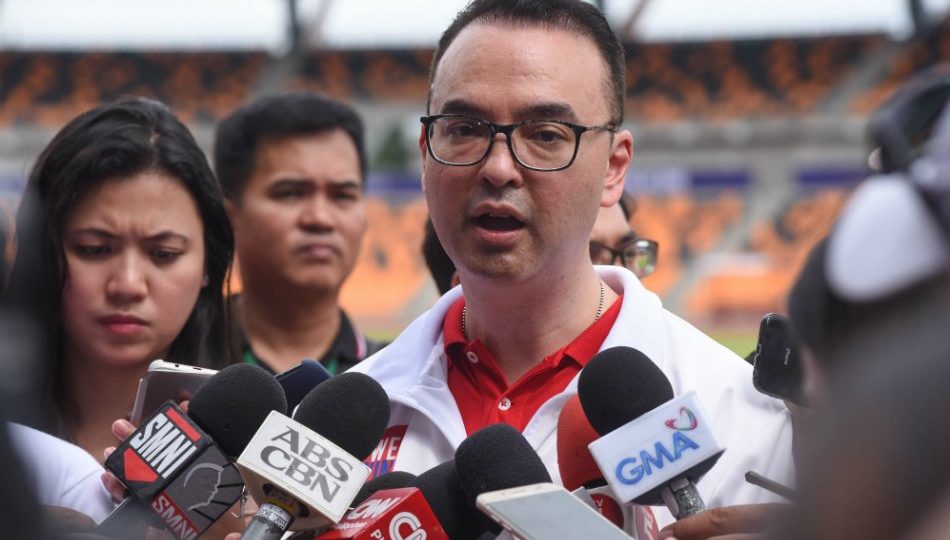The National Commission on Muslim Filipinos (NCMF) today said that their offer to provide halal food for foreign contingents to the Southeast Asian Games was ignored by House Speaker Alan Peter Cayetano, the leader of the event’s organizing committee.
NCMF’s director for external relations, Dimapuno Alonto Datu Ramos Jr., told ABS-CBN News said that they told Cayetano’s committee about the need to provide ample halal food for athletes when they met in September of last year. Ramos said it was the first and last time the NCMF — a body tasked with looking out for the rights of the nation’s Muslims — met with Cayetano face to face.
Read: Hunger Games: Singapore demands ‘urgent, immediate attention’ over lack of halal food at SEA Games
“After we made our suggestion about halal food, they just referred us to other people. We were even the ones chasing them,” Ramos said. “I warned them during the plenary session [where former] Senator Alan Peter Cayetano and other government agency heads were present. They just said ‘noted.'”
Ramos’s revelations cast a new, “we told you so”-tinted light on recent reports that Muslim athletes and officials have already faced problems obtaining enough halal food as athletes arrive ahead of the games.
In a separate interview with Rappler, Ramos also said his agency suggested that organizers include qiblah signs — markers that indicate to praying Muslims the direction of the Kaaba in Mecca — in the games’ venues, in addition to the creation of ablution areas and prayer rooms for Muslim athletes and officials.
“But it was always the same answer from them: ‘we will contact you.’ They did initially, but then it was the NCMF which was always following up and offering to help,” he said.
Read: All Apologies: Cayetano says sorry to athletes as snafus plague lead-up to SEA Games
Indeed, procuring halal food has already become so problematic that the chief of the Singaporean delegation wrote to the organizers this week to demand “urgent and immediate attention” over the problem.
Malaysian delegates, however, managed to evade this issue by preparing their own halal food before flying to the Philippines. Malaysian National Sports Council Director-General Datuk Seri Ahmad Shapawi Ismail told newspaper New Straits Times that they sent an advance party to the Philippines to ascertain what issues they may run into on foreign turf.
“Halal food is a big problem for those staying in hotels right now as it is difficult to get. We knew about this, so we gave out instant nutritious food which only needed to be heated up for the athletes and officials,” he said.
“We have been informed that halal food will only be available from Nov. 26 onwards at hotels, while the Games Villages are more prepared and catering for it from the start. We have prepared what we could for our athletes,” said Shapawi.
Read: Philippines apologizes over SEA games mess
Meanwhile, the much-maligned Cayetano yesterday tried to defend his handling of the games amid a torrent of mishaps, claiming that all the issues that have cropped up could be blamed in part on Senator Franklin Drilon, whom he alleged worked to delay the approval of the event’s budget.
But in an interview today with radio station DZMM, Drilon said the budget was delayed after the House of Representatives, which Cayetano also leads, included billions of pesos’ worth of so-called “pork barrel” spending — extra funds that are tacked on to budgets for members’ pet projects, but which are also notoriously susceptible to corruption.
“If there was a delay, it was because of them,” Drilon said. “The budget that came from the House of Representatives was full of pork barrel funds. About PHP95 billion (US$1.871 billion) of pork barrel. It wasn’t approved immediately because it’s a constitutional issue. Did they do the right thing, for them to include PHP95 billion of pork barrel?”
Cayetano has also attempted to deflect blame by claiming that athletes have told him that the problems the games are facing are merely par for the course for such meets, ABS-CBN News reports. He went on to complain that the press in other host countries had downplayed similar issues, insinuating that the Philippine media is blowing things out of proportion.




